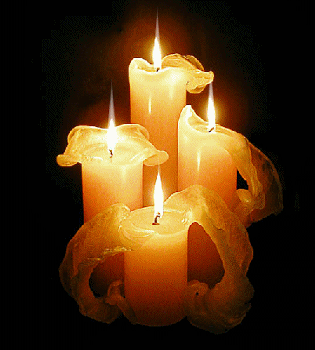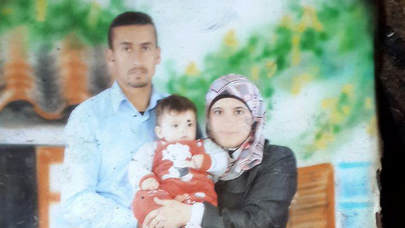1 sept 2015
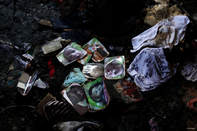
The Israeli authorities extended the ban on Monday on media coverage of developments in the deadly arson attack which took place in Duma in July.
Jewish settlers set fire to the Dawabsheh family home during the attack in the village near Nablus in the occupied West Bank. Eighteen month old Ali Dawabsheh was burnt to death and his father Saad has since died of his injuries. The baby’s mother and brother are still in hospital after suffering serious burns in the incident.
The Israeli police issued a statement this week banning the media from publishing any details or developments related to the investigation until the end of September. An initial one month press embargo was issued on 31 July.
Jewish settlers set fire to the Dawabsheh family home during the attack in the village near Nablus in the occupied West Bank. Eighteen month old Ali Dawabsheh was burnt to death and his father Saad has since died of his injuries. The baby’s mother and brother are still in hospital after suffering serious burns in the incident.
The Israeli police issued a statement this week banning the media from publishing any details or developments related to the investigation until the end of September. An initial one month press embargo was issued on 31 July.
30 aug 2015

Radical activist Meyer Ettinger
A new education ministry program aims to rehabilitate hilltop youth while preventing the next attack; however, the program has experienced very little success.
The Israeli government initiative has a soothing biblical name, the Hebrew Shepherd, and a serious aim: to keep ultranationalist Jewish settler youths from turning to violence and attacking Palestinians and their property.
But the program - which included plans for a summer camp and carpentry courses to keep the kids out of trouble - has foundered. Many settler youths have refused to cooperate after rumors spread that Israel's domestic security agency, Shin Bet, which snoops on Jewish extremists, was involved.
It is but one example of Israel's failure to rein in youths suspected of carrying out ultranationalist attacks. The deadliest such assault, a firebombing last month on a West Bank home, killed an 18-month-old toddler, Ali Dawabsheh, and his father, Saed, and critically wounded his mother and 4-year-old brother. A Star of David and "revenge" in Hebrew were sprayed on the torched home. In the wake of the attack, Israeli Prime Minister Benjamin Netanyahu pledged "zero tolerance" for what he called Jewish terrorism.
But there has been complicit tolerance of the phenomenon for years, say Palestinian leaders, former Israeli security officials and even some settlers. They blame holes in Israel's juvenile welfare system, lax law enforcement, a lenient justice system and rabbis and Israeli leaders unwilling or unable to tackle the elusive young fundamentalists. A main focus of the concern is the so-called "hilltop youth," young people among a settler movement that sets up outposts not authorized by the Israeli government on West Bank hilltops - land the Palestinians claim for their hoped for state.
"There is no serious adult, no individual today who says, 'I am the person who will take responsibility,'" said Avia Azulay, 35, a hilltop settler, speaking from his spacious home in the unauthorized West Bank outpost of Shir Hadash. A youth counselor and former hilltop youth himself, Azulay joined the Hebrew Shepherd program a year ago to try to help keep young extremists from the brink of violence, but resigned because he thought the Shin Bet's alleged involvement undermined the young people's trust.
After last month's firebombing, Israel carried out arrest raids of hilltop outposts and jailed three Israeli settler activists in their early 20s for six months without charge, a measure used regularly against Palestinian detainees but rarely on Israelis. Israel has not yet found the culprits of the deadly attack.
The Israeli rights group B'Tselem said despite the recent crackdown, Israel is unwilling to prosecute settlers suspected of crimes against Palestinians. In the past three years, the group said, Israeli civilians set fire to nine Palestinian homes in the West Bank and hurled a firebomb at a Palestinian taxi, but no one was charged.
"The government has created a climate of impunity with settlers," said Sarit Michaeli of B'Tselem. Israeli human rights group Yesh Din said less than 10 percent of police investigations into alleged Israeli crimes committed against Palestinians and their property from 2005-2014 resulted in indictments.
Israeli police defend their efforts to combat Israeli attacks against Palestinians, and say there has been a big jump in arrests and indictments since a special "nationalistic crimes" unit was created in 2013, though they declined to provide precise numbers.
Critics say influential settler rabbis have done little to publicly denounce the violent youths, and that Israeli leaders have embraced settler activists who support them. Netanyahu himself appeared in an election rally this year co-organized by hilltop youth supporter Daniella Weiss. Recent arrests of young settler activists offer a peek into what the Shin Bet says is a fringe group suspected of arson attacks on Palestinian property in order to bring about religious "redemption."
One suspect, Moshe Orbach, is accused of writing a detailed instruction manual on how to set fire to mosques, churches and Palestinian homes. Entitled "Kingdom of Evil," it instructs activists to form underground cells committed to "sanctifying God's name" - and with members who know how "to keep silent in interrogations."
The other two are Meir Ettinger, the 23-year-old grandson of the late Jewish ultranationalist Meir Kahane, whom the Shin Bet calls the ringleader of the group, and Eviatar Slonim, an activist in the hilltop settlements. All three have been jailed without charge for six months, accused of affiliation with an extremist Jewish organization, an accusation they deny. Their so-called administrative detention is a tactic usually reserved for suspected Palestinian militants.
The Hebrew Shepherd initiative once set its sights on Ettinger as part of its efforts to encourage hilltop youth to learn a vocation, according to the settler website Hakol Hayehudi. Speaking to the website, Ettinger said, "During the first meeting with the workers from the program, I noticed how all their efforts were focused on career and money.
This is fundamentally opposed to our values as Jews who work for the sake of the people of Israel." Menachem Ben Shachar, 38, a relative of Ettinger, said the outreach effort has been unsuccessful because it doesn't address the youth's anger with what they see as Israel's ineffective responses to Palestinian attacks.
"Every time Israel fails in its real mission - defending the people of Israel - it creates a few more frustrated youths. There is no organization that can come afterward and try to extinguish the burning flame in the hearts of these youths," Ben Shachar said in an email exchange with The Associated Press.
Israel's Education Ministry says it spearheaded the Hebrew Shepherd initiative in 2013 to "offer an educational-welfare rehabilitative response to young at-risk boys and girls" in the West Bank settlement areas "as part of systemic efforts to eradicate the phenomenon of nationalist crime," according to a ministry document leaked to Israeli media. In the document, the ministry's director general asked the Shin Bet and other government bodies to participate in the program's steering committee.
Hebrew Shepherd director Roee Simon declined a request for an interview, as did the Shin Bet. The Education Ministry also refused to comment despite repeated requests. Although he left the program, Azulay says he still tries to engage hilltop youth. Three nights a week, the burly man with a bushy black beard packs his dusty red sedan with snacks and heads to the hills to meet with them.
His background as a former hilltop youth, along with his firm handshake and contemporary Hebrew slang, give him credibility. Azulay said the majority of the approximately 1,000 hilltop youth are middle-school and high-school dropouts ranging in age from 14 to 20 from cities within Israel, not the West Bank. Adverse to authority, they are drawn to the defiant spirit of the isolated West Bank hilltops.
Squatting on West Bank land to claim it as Jewish, they are furious with Israel's response to Palestinian attacks, Azulay said, leading some to take vigilante action against their Palestinian neighbors. When the time comes for compulsory military service - their ticket into mainstream Israeli society - the army rejects them as too dangerous. Because social workers from one municipal area are not permitted to handle youth from another area, runaways in the West Bank fall through the cracks of the welfare system, Azulay said. He said settler rabbis are afraid to take them under their wing for fear of being accused of backing the violence.
Azulay said he tries to persuade the teens to stay away from vigilante violence so they don't ruin their chances of enlisting into the army. "Go be a pilot, drop a half-ton bomb on a group of terrorists," he said he tells the youths. Another program piloted by a local settler council tries to rehabilitate hilltop youths by helping them pass matriculation exams and persuading the army to enlist them. It has shown some success at one hilltop outpost and is being expanded to another settlement.
An official in the Israeli prime minister's office said in the last five years, Israel beefed up its intelligence, police and law enforcement resources to deal with Jewish extremism. "We are augmenting our efforts because we see this as a challenge to our democracy," said the official, who spoke on the condition of anonymity because he was not authorized to discuss the matter publicly. But former Shin Bet director Yuval Diskin said political will and public pressure are lacking in the battle to uproot Jewish extremism.
"Violent extremism is a social phenomenon with deep roots. Whoever thinks the Shin Bet, the military or the police can deal with it is mistaken," he wrote on his Facebook page.
A new education ministry program aims to rehabilitate hilltop youth while preventing the next attack; however, the program has experienced very little success.
The Israeli government initiative has a soothing biblical name, the Hebrew Shepherd, and a serious aim: to keep ultranationalist Jewish settler youths from turning to violence and attacking Palestinians and their property.
But the program - which included plans for a summer camp and carpentry courses to keep the kids out of trouble - has foundered. Many settler youths have refused to cooperate after rumors spread that Israel's domestic security agency, Shin Bet, which snoops on Jewish extremists, was involved.
It is but one example of Israel's failure to rein in youths suspected of carrying out ultranationalist attacks. The deadliest such assault, a firebombing last month on a West Bank home, killed an 18-month-old toddler, Ali Dawabsheh, and his father, Saed, and critically wounded his mother and 4-year-old brother. A Star of David and "revenge" in Hebrew were sprayed on the torched home. In the wake of the attack, Israeli Prime Minister Benjamin Netanyahu pledged "zero tolerance" for what he called Jewish terrorism.
But there has been complicit tolerance of the phenomenon for years, say Palestinian leaders, former Israeli security officials and even some settlers. They blame holes in Israel's juvenile welfare system, lax law enforcement, a lenient justice system and rabbis and Israeli leaders unwilling or unable to tackle the elusive young fundamentalists. A main focus of the concern is the so-called "hilltop youth," young people among a settler movement that sets up outposts not authorized by the Israeli government on West Bank hilltops - land the Palestinians claim for their hoped for state.
"There is no serious adult, no individual today who says, 'I am the person who will take responsibility,'" said Avia Azulay, 35, a hilltop settler, speaking from his spacious home in the unauthorized West Bank outpost of Shir Hadash. A youth counselor and former hilltop youth himself, Azulay joined the Hebrew Shepherd program a year ago to try to help keep young extremists from the brink of violence, but resigned because he thought the Shin Bet's alleged involvement undermined the young people's trust.
After last month's firebombing, Israel carried out arrest raids of hilltop outposts and jailed three Israeli settler activists in their early 20s for six months without charge, a measure used regularly against Palestinian detainees but rarely on Israelis. Israel has not yet found the culprits of the deadly attack.
The Israeli rights group B'Tselem said despite the recent crackdown, Israel is unwilling to prosecute settlers suspected of crimes against Palestinians. In the past three years, the group said, Israeli civilians set fire to nine Palestinian homes in the West Bank and hurled a firebomb at a Palestinian taxi, but no one was charged.
"The government has created a climate of impunity with settlers," said Sarit Michaeli of B'Tselem. Israeli human rights group Yesh Din said less than 10 percent of police investigations into alleged Israeli crimes committed against Palestinians and their property from 2005-2014 resulted in indictments.
Israeli police defend their efforts to combat Israeli attacks against Palestinians, and say there has been a big jump in arrests and indictments since a special "nationalistic crimes" unit was created in 2013, though they declined to provide precise numbers.
Critics say influential settler rabbis have done little to publicly denounce the violent youths, and that Israeli leaders have embraced settler activists who support them. Netanyahu himself appeared in an election rally this year co-organized by hilltop youth supporter Daniella Weiss. Recent arrests of young settler activists offer a peek into what the Shin Bet says is a fringe group suspected of arson attacks on Palestinian property in order to bring about religious "redemption."
One suspect, Moshe Orbach, is accused of writing a detailed instruction manual on how to set fire to mosques, churches and Palestinian homes. Entitled "Kingdom of Evil," it instructs activists to form underground cells committed to "sanctifying God's name" - and with members who know how "to keep silent in interrogations."
The other two are Meir Ettinger, the 23-year-old grandson of the late Jewish ultranationalist Meir Kahane, whom the Shin Bet calls the ringleader of the group, and Eviatar Slonim, an activist in the hilltop settlements. All three have been jailed without charge for six months, accused of affiliation with an extremist Jewish organization, an accusation they deny. Their so-called administrative detention is a tactic usually reserved for suspected Palestinian militants.
The Hebrew Shepherd initiative once set its sights on Ettinger as part of its efforts to encourage hilltop youth to learn a vocation, according to the settler website Hakol Hayehudi. Speaking to the website, Ettinger said, "During the first meeting with the workers from the program, I noticed how all their efforts were focused on career and money.
This is fundamentally opposed to our values as Jews who work for the sake of the people of Israel." Menachem Ben Shachar, 38, a relative of Ettinger, said the outreach effort has been unsuccessful because it doesn't address the youth's anger with what they see as Israel's ineffective responses to Palestinian attacks.
"Every time Israel fails in its real mission - defending the people of Israel - it creates a few more frustrated youths. There is no organization that can come afterward and try to extinguish the burning flame in the hearts of these youths," Ben Shachar said in an email exchange with The Associated Press.
Israel's Education Ministry says it spearheaded the Hebrew Shepherd initiative in 2013 to "offer an educational-welfare rehabilitative response to young at-risk boys and girls" in the West Bank settlement areas "as part of systemic efforts to eradicate the phenomenon of nationalist crime," according to a ministry document leaked to Israeli media. In the document, the ministry's director general asked the Shin Bet and other government bodies to participate in the program's steering committee.
Hebrew Shepherd director Roee Simon declined a request for an interview, as did the Shin Bet. The Education Ministry also refused to comment despite repeated requests. Although he left the program, Azulay says he still tries to engage hilltop youth. Three nights a week, the burly man with a bushy black beard packs his dusty red sedan with snacks and heads to the hills to meet with them.
His background as a former hilltop youth, along with his firm handshake and contemporary Hebrew slang, give him credibility. Azulay said the majority of the approximately 1,000 hilltop youth are middle-school and high-school dropouts ranging in age from 14 to 20 from cities within Israel, not the West Bank. Adverse to authority, they are drawn to the defiant spirit of the isolated West Bank hilltops.
Squatting on West Bank land to claim it as Jewish, they are furious with Israel's response to Palestinian attacks, Azulay said, leading some to take vigilante action against their Palestinian neighbors. When the time comes for compulsory military service - their ticket into mainstream Israeli society - the army rejects them as too dangerous. Because social workers from one municipal area are not permitted to handle youth from another area, runaways in the West Bank fall through the cracks of the welfare system, Azulay said. He said settler rabbis are afraid to take them under their wing for fear of being accused of backing the violence.
Azulay said he tries to persuade the teens to stay away from vigilante violence so they don't ruin their chances of enlisting into the army. "Go be a pilot, drop a half-ton bomb on a group of terrorists," he said he tells the youths. Another program piloted by a local settler council tries to rehabilitate hilltop youths by helping them pass matriculation exams and persuading the army to enlist them. It has shown some success at one hilltop outpost and is being expanded to another settlement.
An official in the Israeli prime minister's office said in the last five years, Israel beefed up its intelligence, police and law enforcement resources to deal with Jewish extremism. "We are augmenting our efforts because we see this as a challenge to our democracy," said the official, who spoke on the condition of anonymity because he was not authorized to discuss the matter publicly. But former Shin Bet director Yuval Diskin said political will and public pressure are lacking in the battle to uproot Jewish extremism.
"Violent extremism is a social phenomenon with deep roots. Whoever thinks the Shin Bet, the military or the police can deal with it is mistaken," he wrote on his Facebook page.

Earlier this month, a strange thing happened: a Jewish extremist was held in "administrative detention" by Israel. This practise, internment without charge or trial, dates back to the British occupation of Palestine, and Israel habitually uses it against Palestinians. But for a Jewish citizen to be "administratively detained" is highly unusual. The internee is Meir Ettinger, a 24-year-old pro-settler fanatic who is the grandson of the notorious Rabbi Meir Kahane.
Kahane was the founder of the Jewish Defence League, a terrorist organization founded in New York in 1969. The group was responsible for a string of bombing and other violent attacks against Palestinian, Egyptian and Soviet civilian targets in the 1970s and 1980s, as well as against JDL members who quarrelled with the leadership in one way or another.
Kahane later left for Israel to establish the Kach party, although he always maintained his influence over the JDL in the US (he wrote once that he considered the Kach to be the Israeli branch of the JDL). He was eventually elected to the Knesset, before his faction was ejected and recognised as a terrorist organization. Kahane advocated that all Palestinians should be removed by force from the "Land of Israel" – which in his vision included the West Bank and Gaza Strip.
Kahane was imprisoned by the Israeli authorities, who saw his agitation against the state as a threat. Kahane Chai, the modern-day incarnation of Kach, has been designated an overseas terrorist organization by the US State Department in its latest annual report on such groups.[PDF]
Today, according to reports in the Israeli press, it seems his grandson has become his ideological heir.
According to the Shin Bet, Israel's secret police, Ettinger leads a small cell of fanatical ideologues called "The Revolt". In their conception of a "Jewish state" they want to overthrow the state of Israel and replace it with an even more extreme religious entity – some sort of "Jewish kingdom".
“The idea of ‘The Revolt’ is very simple,” Ettinger wrote in a 2013 manifesto, according to The New Yorker. “Israel has many weak spots: issues that are tiptoed around so as not to create riots. All we need to do is light up the explosives.”
In the wake of the hideous murders of Ali and Saad Dawabsha, an 18-month-old baby and his father near Nablus in July, Israel made a show of public lamentation before the world's press. The lethal attacks came as the culmination of years of settler terrorism against Palestinian civilians. Deemed "price tag" attacks, these acts ranged from vandalism and graffiti to arson and murder. Settlers from Yitzhar, one of the most fanatic of the West Bank settlements, even once launched a home made rocket into a nearby Palestinian village.
Such "terrorists" would now be caught, Netanyahu insisted this month. The very public arrest and internment of Ettinger is part of this show of concern.
But Israel is acting disingenuously. Ettinger is a product of the extremist climate fostered and funded in Israel and the settlements by the state itself.
As Haaretz columnist Sefi Rachlevsky puts it: "The Shin Bet security service has a great deal of chutzpah. After years of indulging messianic Jewish terror, it places the theological revolution on the shoulders of one Meir Ettinger, as if 'he doesn’t listen to the rabbis.' Why it is convenient for Prime Minister Benjamin Netanyahu to write it off to uncontrollable 'wild weeds' is quite clear; it was convenient in the same way after the murder of Yitzhak Rabin."
Rachlevsky points out that Neyanyahu himself has praised extremists, including the fanatic settler Rabbi Dov Lior, who uses his platform to openly call for ethnic cleansing. Last year he said that Israel "must strive to cleanse the entire country" of Palestinians. Lior called Baruch Goldstein (who shot to death 29 Muslim worshippers in Hebron in 1994) “holier than all the martyrs of the Holocaust.”
And yet this is not some outlier that the state can pretend it has no links to. Lior is an important spiritual leader in the "Jewish Home" party of Naftali Bennet, the current education minister. Lior put forward the name of Uri Ariel towards the Jewish Home electoral list (Ariel, a settler himself, was housing minister in the last government and is agriculture minister in the current one).
Furthermore, several top advisers in the Jewish Home party were once members of the "Jewish Underground" which terrorised Palestinian civilians in the 1980s, including car bombings targetting the mayors of Nablus and Ramallah, who had to have legs amputated as a result, and only narrowly escaped with their lives.
While it is easy for the Israeli establishment to make a scapegoat of Ettinger, the fact is that he is very much their own son.
An associate editor with The Electronic Intifada, Asa Winstanley is an investigative journalist who lives in London.
Kahane was the founder of the Jewish Defence League, a terrorist organization founded in New York in 1969. The group was responsible for a string of bombing and other violent attacks against Palestinian, Egyptian and Soviet civilian targets in the 1970s and 1980s, as well as against JDL members who quarrelled with the leadership in one way or another.
Kahane later left for Israel to establish the Kach party, although he always maintained his influence over the JDL in the US (he wrote once that he considered the Kach to be the Israeli branch of the JDL). He was eventually elected to the Knesset, before his faction was ejected and recognised as a terrorist organization. Kahane advocated that all Palestinians should be removed by force from the "Land of Israel" – which in his vision included the West Bank and Gaza Strip.
Kahane was imprisoned by the Israeli authorities, who saw his agitation against the state as a threat. Kahane Chai, the modern-day incarnation of Kach, has been designated an overseas terrorist organization by the US State Department in its latest annual report on such groups.[PDF]
Today, according to reports in the Israeli press, it seems his grandson has become his ideological heir.
According to the Shin Bet, Israel's secret police, Ettinger leads a small cell of fanatical ideologues called "The Revolt". In their conception of a "Jewish state" they want to overthrow the state of Israel and replace it with an even more extreme religious entity – some sort of "Jewish kingdom".
“The idea of ‘The Revolt’ is very simple,” Ettinger wrote in a 2013 manifesto, according to The New Yorker. “Israel has many weak spots: issues that are tiptoed around so as not to create riots. All we need to do is light up the explosives.”
In the wake of the hideous murders of Ali and Saad Dawabsha, an 18-month-old baby and his father near Nablus in July, Israel made a show of public lamentation before the world's press. The lethal attacks came as the culmination of years of settler terrorism against Palestinian civilians. Deemed "price tag" attacks, these acts ranged from vandalism and graffiti to arson and murder. Settlers from Yitzhar, one of the most fanatic of the West Bank settlements, even once launched a home made rocket into a nearby Palestinian village.
Such "terrorists" would now be caught, Netanyahu insisted this month. The very public arrest and internment of Ettinger is part of this show of concern.
But Israel is acting disingenuously. Ettinger is a product of the extremist climate fostered and funded in Israel and the settlements by the state itself.
As Haaretz columnist Sefi Rachlevsky puts it: "The Shin Bet security service has a great deal of chutzpah. After years of indulging messianic Jewish terror, it places the theological revolution on the shoulders of one Meir Ettinger, as if 'he doesn’t listen to the rabbis.' Why it is convenient for Prime Minister Benjamin Netanyahu to write it off to uncontrollable 'wild weeds' is quite clear; it was convenient in the same way after the murder of Yitzhak Rabin."
Rachlevsky points out that Neyanyahu himself has praised extremists, including the fanatic settler Rabbi Dov Lior, who uses his platform to openly call for ethnic cleansing. Last year he said that Israel "must strive to cleanse the entire country" of Palestinians. Lior called Baruch Goldstein (who shot to death 29 Muslim worshippers in Hebron in 1994) “holier than all the martyrs of the Holocaust.”
And yet this is not some outlier that the state can pretend it has no links to. Lior is an important spiritual leader in the "Jewish Home" party of Naftali Bennet, the current education minister. Lior put forward the name of Uri Ariel towards the Jewish Home electoral list (Ariel, a settler himself, was housing minister in the last government and is agriculture minister in the current one).
Furthermore, several top advisers in the Jewish Home party were once members of the "Jewish Underground" which terrorised Palestinian civilians in the 1980s, including car bombings targetting the mayors of Nablus and Ramallah, who had to have legs amputated as a result, and only narrowly escaped with their lives.
While it is easy for the Israeli establishment to make a scapegoat of Ettinger, the fact is that he is very much their own son.
An associate editor with The Electronic Intifada, Asa Winstanley is an investigative journalist who lives in London.
28 aug 2015
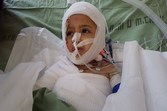
“What was I burned for? Where is my family” were the very first words mumbled by four-year-old victim of an Israeli arson attack, Ahmad Saa’d Dawabsheh, after his health status has seen a slight improvement.
Ahmad’s brother, an 18-month toddler, was burned to death after Israeli vandals set fire to their family home in Duma. His father succumbed to his wounds few days later in the Soroka hospital in Beersheba.
“What was I burned for? Why am I held in this bed?” Ahmad asked his grandfather.
“Ahmad keeps asking me to contact his father to take him back home from the hospital,” Ahmad’s grandfather said.
“I want to go back home. Where is my young brother? Where is my mother?” his grandfather quoted him as wondering with tears in his eyes.
Both Ahmad and his mother underwent a skin grafting surgery. Medics said their health status is still critical despite the slight improvements in Ahmad’s health.
The grandfather called for urgently arresting the Israeli vandals who perpetrated the arson attack and prosecuting them without further delay.
Ahmad’s brother, an 18-month toddler, was burned to death after Israeli vandals set fire to their family home in Duma. His father succumbed to his wounds few days later in the Soroka hospital in Beersheba.
“What was I burned for? Why am I held in this bed?” Ahmad asked his grandfather.
“Ahmad keeps asking me to contact his father to take him back home from the hospital,” Ahmad’s grandfather said.
“I want to go back home. Where is my young brother? Where is my mother?” his grandfather quoted him as wondering with tears in his eyes.
Both Ahmad and his mother underwent a skin grafting surgery. Medics said their health status is still critical despite the slight improvements in Ahmad’s health.
The grandfather called for urgently arresting the Israeli vandals who perpetrated the arson attack and prosecuting them without further delay.
25 aug 2015
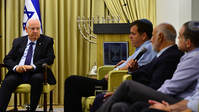
President makes remarks in meeting with settler leaders in the wake of harsh criticism leveled at him during the aftermath of the Duma attack.
President Reuven Rivlin said during talks with settler leaders on Monday that Israel had a "right" to build settlements in the West Bank, his office said in a statement.
"I love the land of Israel with all my heart. I have never and will never give up on this land. For me, our right to this land is not a matter of political debate. It is a basic fact of modern Zionism," Rivlin said,
For Rivlin the "land of Israel" includes the West Bank, where Jewish settlements are considered illegal under international law.
"We must not give anyone the sense that we are in any doubt about our right to our land. For me, the settlement of the land of Israel is an expression of that right, our historical right, our national right," Rivlin said.
"I have no doubt that it is clear to all of us, that in order to realize the ultimate goal of building the land of Israel, we must be sure to do so only with the use of the legal tools available to us. Our sovereignty in this land, means responsibility for all those who live here, and obliges all of us to uphold the strictest of moral codes, which is inherent in each and every one of us," the president continued.
His comments come at a time of heightened tension between Israel and the Palestinians following the death in July of a Palestinian toddler and his father in an arson attack on their home.
In the wake of the firebombing in the West Bank village of Duma, three alleged Jewish extremists were placed in administrative detention.
On Sunday, the Shin Bet domestic security agency said the deadly attack had "emanated" from a wildcat Jewish settlement outpost near Duma.
The agency said "restraining orders" restricting the movement of 10 activists had been issued as a result.
Rivlin condemned "Jewish terrorism" after the July arson attack in a post on Facebook, which was later followed by death threats against him.
President Reuven Rivlin said during talks with settler leaders on Monday that Israel had a "right" to build settlements in the West Bank, his office said in a statement.
"I love the land of Israel with all my heart. I have never and will never give up on this land. For me, our right to this land is not a matter of political debate. It is a basic fact of modern Zionism," Rivlin said,
For Rivlin the "land of Israel" includes the West Bank, where Jewish settlements are considered illegal under international law.
"We must not give anyone the sense that we are in any doubt about our right to our land. For me, the settlement of the land of Israel is an expression of that right, our historical right, our national right," Rivlin said.
"I have no doubt that it is clear to all of us, that in order to realize the ultimate goal of building the land of Israel, we must be sure to do so only with the use of the legal tools available to us. Our sovereignty in this land, means responsibility for all those who live here, and obliges all of us to uphold the strictest of moral codes, which is inherent in each and every one of us," the president continued.
His comments come at a time of heightened tension between Israel and the Palestinians following the death in July of a Palestinian toddler and his father in an arson attack on their home.
In the wake of the firebombing in the West Bank village of Duma, three alleged Jewish extremists were placed in administrative detention.
On Sunday, the Shin Bet domestic security agency said the deadly attack had "emanated" from a wildcat Jewish settlement outpost near Duma.
The agency said "restraining orders" restricting the movement of 10 activists had been issued as a result.
Rivlin condemned "Jewish terrorism" after the July arson attack in a post on Facebook, which was later followed by death threats against him.
24 aug 2015
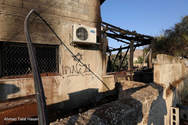
Palestinian natives of Duma woke up on the screams of a family after their home was set on fire by suspected Israeli arsonists at the crack of Monday’s dawn.
A PIC journalist quoted local sources as reporting that unidentified arsonists threw flammable materials on the home of Mnawar Rashid Dawabsheh. One room was totally destroyed by fire while the rest of the house and furniture sustained remarkable material damage.
Civil crews, who rushed to the scene, managed to put out the fire and save the family.
One of the children, who were indoors, choked on the toxic flames and smokes engulfing the house from all directions and was rushed to hospital for urgent treatment.
Palestinian policemen showed up at the scene and started a probe into the arson attack.
On-the-spot observers pointed out the striking similarity between the fire attack and the way the recent Duma arson attack, which killed 18-month-old toddler Ali and his father Saa’d, was carried out, validating suspicions that Israeli vandals are responsible for the crime.
A PIC journalist quoted local sources as reporting that unidentified arsonists threw flammable materials on the home of Mnawar Rashid Dawabsheh. One room was totally destroyed by fire while the rest of the house and furniture sustained remarkable material damage.
Civil crews, who rushed to the scene, managed to put out the fire and save the family.
One of the children, who were indoors, choked on the toxic flames and smokes engulfing the house from all directions and was rushed to hospital for urgent treatment.
Palestinian policemen showed up at the scene and started a probe into the arson attack.
On-the-spot observers pointed out the striking similarity between the fire attack and the way the recent Duma arson attack, which killed 18-month-old toddler Ali and his father Saa’d, was carried out, validating suspicions that Israeli vandals are responsible for the crime.
